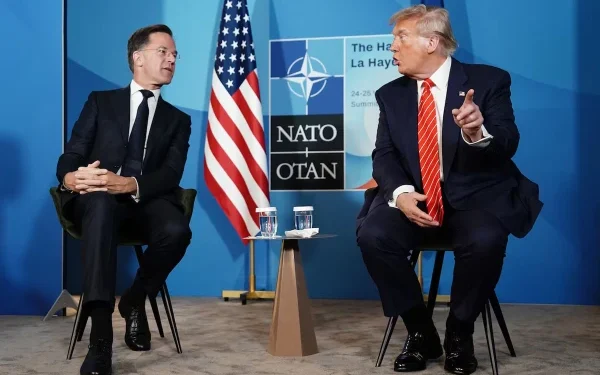Introduction: A Comment That Sparked Global Headlines
In recent days, an unexpected remark by NATO’s new Secretary-General Mark Rutte created a storm on social media and in international political circles. During an informal conversation with journalists, Rutte reportedly referred to former U.S. President Donald Trump as “daddy” while commenting on Trump’s strong rhetoric regarding Iran and Israel.
The comment quickly went viral, spawning widespread reactions, memes, and sharp criticism. Amidst growing curiosity and backlash, Rutte has now clarified the context behind the controversial term.
The Context: NATO, Trump, and Rising Tensions in the Middle East
Mark Rutte, who assumed office as NATO’s Secretary-General following his long tenure as the Prime Minister of the Netherlands, made the comment while discussing the current geopolitical scenario—particularly escalating tensions between the U.S., Israel, and Iran.
The statement came shortly after the U.S. military conducted targeted airstrikes on Iran’s nuclear facilities, reportedly under the strategic direction of Donald Trump, who has returned to the global spotlight amid these developments.
Trump’s renewed engagement in Middle Eastern affairs has included fierce public statements against Iran’s nuclear ambitions and unwavering support for Israel. These actions are seen by some NATO allies as a reassertion of American military leadership in the region.
The Controversial Comment: ‘Sometimes Daddy Has to Use Strong Language’
In what appeared to be an attempt to explain Trump’s aggressive stance, Rutte was quoted saying, “Sometimes daddy has to use strong language,” implying that tough rhetoric is sometimes necessary to maintain global order and deter hostile powers.
This offhand remark, though informal, drew immediate attention due to the use of the word “daddy” in reference to Trump—an expression that carries connotations far beyond its literal meaning, particularly on the internet and in meme culture.
Social media platforms like X (formerly Twitter), Reddit, and TikTok were flooded with posts mocking or questioning the comment. Memes portraying Trump in exaggerated patriarchal roles circulated widely, with hashtags like #TrumpDaddy and #NATOmeme trending in some regions.
Public Backlash and Social Media Storm
The reaction from both political commentators and the general public was swift and intense. Critics accused Rutte of showing undue deference to Trump, with some questioning whether NATO was becoming too influenced by American political figures.
Others pointed out that the phrase, regardless of intent, sounded overly submissive and inappropriate in a professional diplomatic context.
Numerous think tanks and political analysts chimed in. Some argued that the phrasing undermined NATO’s image as a neutral, collective security organization and gave the impression that it operates under U.S. dominance.
Rutte’s Clarification: ‘It Was Taken Out of Context’
Facing growing pressure, NATO Chief Mark Rutte issued a public clarification. Speaking to European press agencies, Rutte said:
“My comment has been taken completely out of context. I did not mean to refer to President Trump in that manner, nor was I trying to make a political statement of subservience.”
He further explained that the term “daddy” was used metaphorically in a broader conversation about international diplomacy and leadership dynamics, not specifically about Donald Trump.
“It was a casual, off-the-cuff remark intended to describe the use of firm language by a global power. It was never meant as a personal label for the former president,” Rutte added.
Despite this clarification, the explanation did little to quell the online memes and jokes, with many social media users continuing to highlight the unusual nature of the phrase.
The Broader Implications for NATO and Diplomacy
This incident, though seemingly minor, has reopened discussions about the delicate balance NATO must maintain between the interests of its 31 member states—especially the United States—and the organization’s own autonomy.
Donald Trump has had a contentious relationship with NATO in the past, having repeatedly criticized member states for not spending enough on defense and threatening to reduce U.S. involvement in the alliance.
Rutte’s seemingly affectionate or submissive comment, even if made in jest or taken out of context, revived old concerns about how much influence U.S. politics exerts over NATO leadership.
Trump’s Role in the Iran-Israel Conflict: A Polarizing Figure
Former President Trump has taken credit for authorizing or supporting the U.S. strikes on Iranian nuclear facilities in Fordow, Natanz, and Isfahan, calling them “decisive actions to stop a nuclear threat.”
His supporters argue that his assertive policies are once again restoring American strength on the world stage, while his critics warn that such unilateral actions could lead to long-term instability.
In this heated environment, even symbolic or humorous comments can be magnified and scrutinized, especially when they involve global leaders and volatile geopolitical issues.
NATO’s Neutral Role and the Importance of Language
NATO, as a military alliance, is meant to act collectively on security matters while maintaining neutrality in political disputes between or involving member states. The alliance’s credibility relies heavily on its ability to be seen as unbiased and driven by consensus.
Diplomatic language, therefore, is a critical tool. Even an informal remark can have consequences—whether diplomatic, symbolic, or public-relations-related.
Analysts suggest that leaders and representatives of NATO should be especially cautious about the tone and phrasing of their comments, given the sensitive nature of international military diplomacy.
Conclusion: A Lesson in Diplomacy and Public Perception
While Mark Rutte’s “daddy” comment may have been intended as lighthearted or metaphorical, its viral spread and the reaction it triggered underscore how easily words can be misinterpreted—especially in the world of high-stakes global diplomacy.
As the world navigates a period of renewed military tension and shifting alliances, NATO and its leadership must walk a careful line—balancing humor with seriousness, loyalty with neutrality, and strength with diplomacy.
Though Rutte has since clarified the remark, the incident serves as a reminder that in today’s interconnected and media-savvy world, even a single word can travel far, shape narratives, and influence perceptions.

























